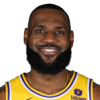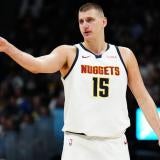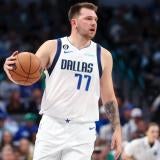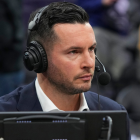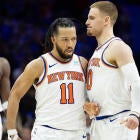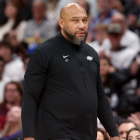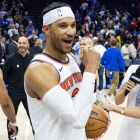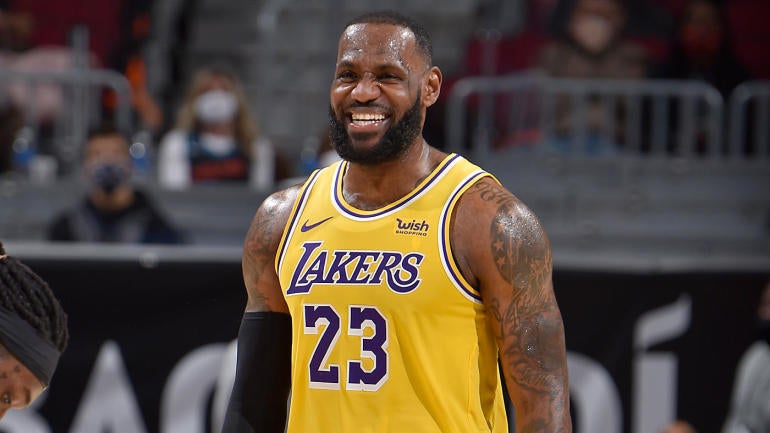
LeBron James typically isn't shy about his interest in individual accolades. He was pissed off when he received only 16 first-place MVP votes last season, has openly declared that Marc Gasol took his Defensive Player of the Year trophy in 2013 and even refused to refer to Derrick Rose by name for a period in 2011, instead calling him only "the MVP" out of apparent spite. LeBron thinks he deserves to win the MVP most years. He wants to win it every year. But his age and a condensed schedule presented serious theoretical barriers to his candidacy this season, and he seemed at peace with that before games even began.
"We're going to be as smart as I can be in making sure that my body and making sure that I'm ready to go," James told reporters in regards to his historically short 71-day offseason. "Every game matters, but we're competing for something that's high. I understand that with the shortened [training camp] and the offseason is going to be the shortest in any professional sports ever, we're going to be very conscious about what we do going forward and with me personally."
That statement read as code for the load management we all expected James to engage in this season. In some ways, he arguably has. While LeBron has played in every Los Angeles Lakers game this season, he's playing in a career-low 32.7 minutes within those games. That places him outside of the top 50 in average minutes played, but he's saving even more energy in how he approaches those minutes. James, on average, was the slowest player in the NBA through his first 17 appearances with an average movement speed of only 3.61 miles per hour, according to NBA.com tracking data. LeBron is playing fewer minutes and expending less energy throughout those minutes than ever.
The addition of Dennis Schroder has artificially managed LeBron's load even further. With a true point guard in place, LeBron is averaging only 83.1 touches per game. That's his lowest total since playing with Kyrie Irving in the 2015-16 season. His 18.6 field goal attempts per game are a bottom-five figure for him, and for the first time in his career, James is taking more shots from behind the arc (6.6 per game) than he is from the restricted area (6.2), preserving his body even further. LeBron may want to win the MVP award this season. He likely does because, historically speaking, he always does. But he's playing as if it matters less to him than ever.
And yet, following his 46-point explosion to beat the Cleveland Cavaliers on Monday, some oddsmakers are listing LeBron as the odds-on favorite to win the award. Even those that don't, like William Hill Sportsbook, have him listed in the neighborhood of plus-650, right in the thick of the race. After years of fruitless campaigning, James has a genuine shot at winning his fifth MVP award largely by accident.
To some extent, he owes that to his competition. Preseason favorite Luka Doncic plays for a sub-.500 Dallas Mavericks team that is ranked only 16th in scoring per 100 possessions after posting the most efficient offense in NBA history last season. Two-time defending champion Giannis Antetokounmpo has seen a similar team-wide decline on defense, as the Bucks dropped from first to 10th so far this season, while his own scoring, rebounding and assists are all down. Nikola Jokic is likely the statistical leader of the pack, but is the worst defender in the race aside from Doncic. Joel Embiid and Kevin Durant contribute on both ends of the floor, but have already missed a number of games and will likely miss a good deal more. The runway is clearing for LeBron in ways that it hasn't in years past.
Yet the true strength of his candidacy to this point is based on the old stalwart. Through the first month and change of the season, LeBron has been the best player on the best team, and more often than not, that is the player who wins the award. James knows that well. His teams had the best record in the NBA in three of his four MVP seasons, and 15 of the past 25 winners have played for the league's best regular-season team. When that team doesn't produce the MVP, it's usually because multiple stars are splitting the vote. That likely contributed to LeBron's loss last season, as Anthony Davis led the Lakers in most major statistical categories. That won't be an issue this time around. Davis has jogged through the first month of the season with the energy one would expect out of a typical defending champion whose offseason was cut in half. He is flirting with post-rookie career-lows in points, rebounds, blocks and steals thus far. The Lakers would not have the best record in the NBA if LeBron was matching Davis' lethargy. Instead, he's been the engine behind virtually all of their winning lineups.
The Lakers are outscoring opponents by 12.5 points per 100 possessions with James on the floor and only 1.2 with him off, a gap that eclipses even last year's 10.4 point differential. The Lakers have eight total lineup combinations that have outscored opponents by at least 10 points so far this season, and LeBron has led six of them. With garbage time filtered out, lineups featuring James and not Davis have outscored opponents by 6.8 points per 100 possessions, but reverse the two and the Lakers get outscored by 3.5 points per 100 possessions, per Cleaning the Glass. Davis has missed two games and the Lakers won both of them. LeBron is the common denominator of their success.
That may not be enough to make him the MVP. His statistical case was stronger last season, when he led the NBA in assists and could credibly call himself the only Lakers ball-handler. A deeper roster has led to his lowest scoring average since his rookie season, and despite significant improvement from behind the 3-point line, his overall efficiency is roughly in line with where it's been since he joined the Lakers. Previous winners are judged against themselves as much as they are judged against their competition, and in many ways, this has been LeBron's least impressive individual season in quite some time. It just so happens that his worst is better than almost everybody else's best.
When a clear frontrunner fails to emerge from the pack, James becomes a perpetually viable default. LeBron is LeBron. He is inevitable, the same player every year plus or minus a stylistic quirk or two. That consistency is the driving force behind his candidacy. He doesn't need to ramp up or break some specific statistical barrier. He affects winning on such a fundamental level that his value is a constant. He is the only player good enough to win an MVP by accident, and while the race is too young to say for certain that he will, the fact that he's making a case at all is what makes him so special. The race around him changes every year, but he never does. He couldn't fall out of the MVP conversation if he tried.







